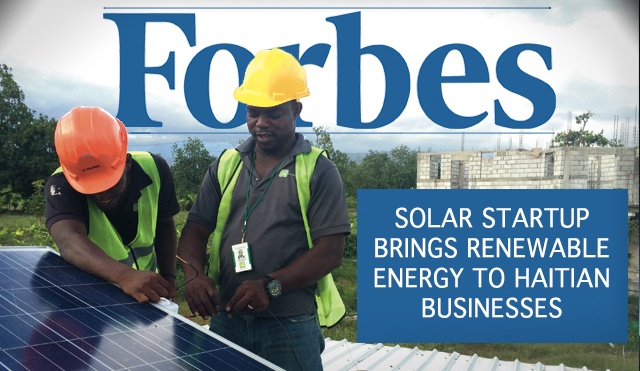Solar Startup Brings Renewable Energy To Haitian Businesses
By: Neil Yeoh
One of the most exposed countries in the world to natural disasters, Haiti, an independent island state in the Caribbean with a population of close to 11 million, has been hit by hurricanes, floods and earthquakes with increasing ferocity and frequency. In 2016, Hurricane Matthew wiped out agricultural farms in South Haiti, which prior that year brought 74% of the country’s new jobs.
Although sharing the island with neighboring Dominican Republic where everyone has access to electricity, Haiti has limited access to electricity – where only 38% of Haitians in 2016 have a connection to the electrical grid, a small improvement from 28% of Haitians in 1990. Even those with access to the grid today still experience frequent blackouts and unreliable power quality.
Despite dealing with natural disasters and energy poverty, Haiti has optimistically made hard commitments to create a renewable energy economy.
In September 2017, the Haitian Parliament eliminated import tariffs and duties on solar equipment (the US, moving in the opposite direction, imposed a 30% import tariff on Chinese solar panels only a few months later in January 2018). Economy and Finance Minister Jude Alix Patrick Salomon stated in an interview with Haiti newspaper Le Nouvelliste, “we wanted to encourage, as part of this budget, the acquisition of equipment from alternative sources of energy.”
How will large-scale solar be implemented in Haiti?
Leading the charge, millennial female social entrepreneur, Sandra Kwak, and founder of social venture 10Power, is pioneering the way in Haiti by fostering the collaborative support of the public and private sectors. Working in frontier markets, 10Power partners with local installers, providing and financing project developments for commercial-scale solar and energy storage solutions. In turn, this builds market ecosystems. “Our goal is to provide affordable, reliable renewable energy that will save businesses money and create jobs,” says Kwak.
10Power estimates the addressable market for commercial-scale solar in Haiti is currently over $500 million . The company has a current sales pipeline of over $100 million. “Haiti has the potential to quickly become a renewable energy powerhouse,” says Kwak. “The steps that are being taken in this direction are encouraging.”
Launched in 2016, the company has financed and installed solar power for two water purification centers, providing clean drinking water to surrounding schools and communities and supporting over 600 micro-enterprises, majority women-led. 10Power is continuing its work with plans to implement a large-scale solar energy project with an undisclosed international NGO in the coming months.
Kwak’s efforts to date have been recognized, from being awarded an Echoing Green Fellowship (Disclaimer: I work for Echoing Green) to most recently receiving investments from LIFT Economy Force for Good Fund and SheEO.
10Power’s enthusiasm for solar in Haiti is shared and supported by the local government. The Haitian Ministry of Public Works, Transportation and Communications (MTPTC) is working with the World Bank to develop a framework to deploy sustainable mini-grids. “It is exciting to see private sector and international development partnerships taking off,” says Nicolas Allien, Senior Energy Specialist and SREP-CTF Projects Coordinator at MTPTC. “We are implementing well-targeted financial instruments and policy measures in order to attract private sector investments in both on-grid and off-grid renewable energy solutions.”
Haitian President, Jovenel Moïse has set a goal of 24-hour electricity, which he announced in June 2017. His government has formed a National Regulatory Authority for the Energy Sector (ANARSE) led by Evenson Calixte, who is tasked with “facilitating the transition [of the energy sector] from a quasi-monopoly to unprecedented openness to the participation of other state actors…from the private sector.”
So what?
Haiti, despite dealing with natural disasters and energy poverty, is committed and positioned to achieve a renewable energy future. Emerging nations, such as Haiti, should not be underestimated in their potential to shift rapidly to a green future, leapfrogging the fossil fuels industry , with long-term investment and support from the public and private sectors. “Distributed renewable energy has the potential to increase resiliency, prosperity and power sustainable development,” says Kwak, and to achieve this at scale social ventures, such as 10Power, are critical.
Article Link:

